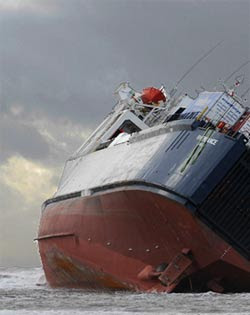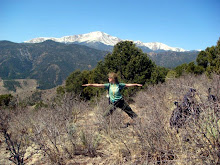 The whining and hang-wringing about the "credit crunch" is getting on my nerves. It was this supposed crisis that led to the $700 billion bailout and we're told every day that it must be solved quickly, no matter the cost, or we're toast. But why? How many of us are actively seeking credit right now? Surely the developers and retailers want us to have lots and lots of it so we can keep hyper-consuming their goods; the bankers want us to have it so they can collect their interest and fees but, seriously, is free-flowing credit what the American public needs right now? Living beyond our means is what caused the credit meltdown in the first place!
The whining and hang-wringing about the "credit crunch" is getting on my nerves. It was this supposed crisis that led to the $700 billion bailout and we're told every day that it must be solved quickly, no matter the cost, or we're toast. But why? How many of us are actively seeking credit right now? Surely the developers and retailers want us to have lots and lots of it so we can keep hyper-consuming their goods; the bankers want us to have it so they can collect their interest and fees but, seriously, is free-flowing credit what the American public needs right now? Living beyond our means is what caused the credit meltdown in the first place!
Here's a meaty statistic: the Baltic Dry Index, which measures the demand for global shipping capacity, dropped from 11,793 last May to, get this, an inconceivable zero. The complexity of the BDI is beyond the scope of this post but, suffice it to say, there are lots of cargo ships sitting at anchor today. The collapse of the BDI augurs a rapidly evaporating demand for foreign goods. Combine this with the massive deterioration in domestic consumption during the fourth quarter of 2008, and wager a guess as to the meaning of it all. We're not buying anything and the world is following suit! So tell me, Wall Street wizards, why the continued hyperbole about a credit crunch?
How could our purchasing habits change so dramatically overnight? Currently, Americans own an estimated 250 million personal computers and 175 million iPods. There are 9 million mobile homes within our borders, approximately 102-130 million single-family homes, and countless million apartments. One could safely assert that there's a home, an mp3 player and a personal computer for every man, woman and child in the United States. I'll go on. Everyone has a television, a cell phone. Nearly everyone owns a car. Most have closets full of clothes they never wear, and we all have too many shoes. So when Barack Obama, Ben Bernanke or anyone else talks about freeing up the flow of credit, we should ask ourselves why.
Recently, through the dense economic fog came a thin ray of revelation: I may actually have enough stuff. Perhaps, just maybe, I can stop buying new stuff for awhile. I can keep my slightly dented iPod for yet another year. My Toyota with 90,000 miles is probably good for another road trip or two. I won't move to a bigger house just yet, or buy the 52" flatscreen Santa forgot to leave under the tree. I may have to forego the spring sales and make do with last summer's tank tops, wrong color though they may be.
I don't mean to minimize the hardship of doing without, but we are a nation of excess inventory. Somewhere in our stuffed dressers and overfull garages, there is room to accommodate a changed perspective.
Wall Street is telling us that all will soon be well. If we just give them hundreds of billions, they'll take their cut and loan the rest to us so we can get back to "business as usual". But what if we don't cooperate with their economic "recovery" plan? What if we collectively turn our backs on Wall Street and Madison Avenue and live simply, buying what we need and paying as we go, stopping to share with others along the way?
Remember, our banks and investment companies built themselves toward inevitable failure during the economic boom. Don't expect them to act nobly in the coming recession because they won't -- you can bank on that. So stop worrying about their silly market indices and their credit machinations. Let the Federal government give them another trillion pieces of worthless paper. Help them plaster their walls with negotiable instruments. Make them eat derivatives for breakfast, sell them short against the box and leverage them to outerspace. Leave them with their excess shipping capacity and their phantom dollar bills.
It's time for the rest of us to disembark this sinking stinking ship for good.
Thursday, January 22, 2009
the bad shipping news
Wednesday, January 14, 2009
Revolutionaries in the wilderness

Edward Abbey presaged America’s current path to tyranny forty years ago and predicted that the end of American democracy would be coincident with the destruction of the wilderness.
What’s the connection between democracy and wilderness? Personal liberty is a fleeting commodity, according to Abbey, and history has shown that governments invariably move toward totalitarianism. When faced with authoritarian governance, wilderness is crucial because it serves as both a refuge from political oppression and a base for guerrilla warfare. Uprisings in urban settings are too quickly quelled by those with better weaponry, but hidden in mountain, desert or jungle settings, revolutionaries can gain an edge on establishment forces and engage in protracted — sometimes successful — battle. Consider Che in the mountains, the Vietcong in the jungle, Osama bin Laden in a desert cave.
From Desert Solitaire:
Suppose we were planning to impose a dictatorial regime upon the American people — the following preparations would be essential:
1. Concentrate the populace in megalopolitan masses so they can be kept under close surveillance and where, in the case of trouble, they can be bombed, burned, gassed or machine-gunned with a minimum of expense and waste.
2. Mechanize agriculture to the highest degree of refinement, thus forcing most of the scattered farm and ranching population into the cities. Such a policy is desirable because farmers, woodsmen, cowboys, Indians, fishermen and other relatively self-sufficient types are difficult to manage unless displaced from their natural environment.
3. Restrict the possession of firearms to the police and the regular military organizations.
4. Encourage or at least fail to discourage population growth. Large masses of people are more easily manipulated and dominated than scattered individuals.
5. Continue military conscription. Nothing excels military training for creating in young men an attitude of prompt, cheeful obedience to officially constituted authority.
6. Divert attention from deep conflicts within the society by engaging in foreign wars; make support of these wars a test of loyalty, thereby exposing and isolating potential opposition to the new order.
7. Overlay the nation with a finely reticulated network of communications, airlines and interstate autobahns.
8. Raze the wilderness. Dam the rivers, flood the canyons, drain the swamps, log the forests, strip-mine the hills, bulldoze the mountains, irrigate the deserts and improve the national parks into national parking lots.
In a final round of environmental fuck-yous, the Bush administration has offered up significant portions of pristine Utah wilderness to oil exploration. Aside from one notable monkeywrenching incident, the trashing of the American wilderness continues unabated.
Posted by
Marie Walden
at
2:56 PM
1 comments
![]()
Labels: Anarchism, Edward Abbey, Environment, Liberty
Tuesday, January 13, 2009
the comforting solidity of Mother Earth
"We are preoccupied with time. If we could learn to love space as deeply as we are now obsessed with time, we might discover a new meaning in the phrase to live like men."
~Edward Abbey, Desert Solitaire














Posted by
Marie Walden
at
12:09 PM
1 comments
![]()
Labels: adventure, national parks, Travel
Monday, January 12, 2009
Strengthening my resolve
It's already twelve days into the new year and I'm just getting around to making some resolutions. Actually, I made some resolutions awhile ago but I'm only now getting to the Resolution Implementation phase which doesn't bode well for my poor dear resolutions.
One big resolution for 2009? Write more. And I will later today, or maybe tomorrow. Hopefully before 2010.
Dang.
Posted by
Marie Walden
at
10:25 AM
0
comments
![]()

